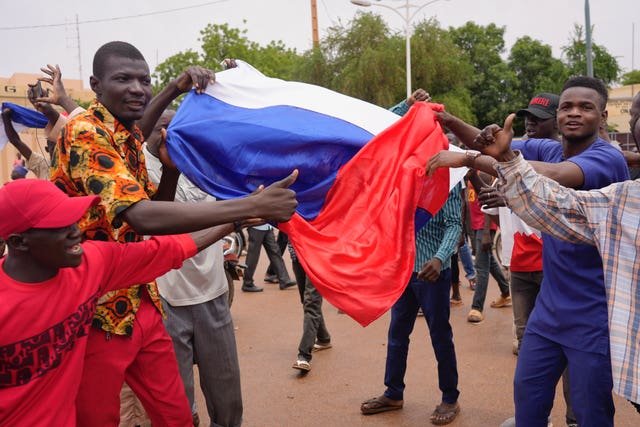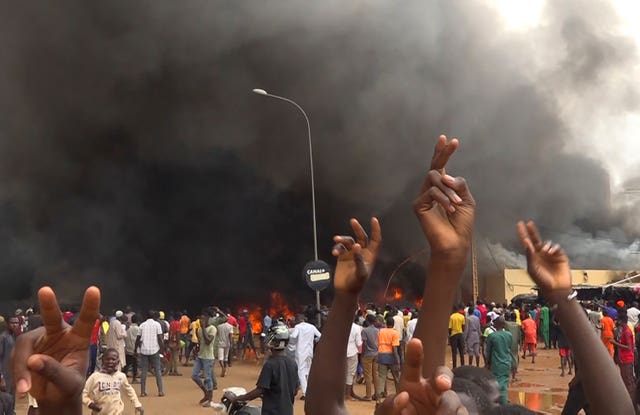
Clive Bull 1am - 4am
28 July 2023, 14:14

Abdourahmane Tchiani said the country needed to change course to avoid ‘gradual and inevitable demise’ so he and others decided to intervene.
The general who led a coup in Niger has taken to state television to ask for support for the takeover.
It comes two days after members of the military detained democratically elected president Mohamed Bazoum – sparking political chaos which could set back the nation’s fight against jihadists and increase Russia’s influence in West Africa.
As Abdourahmane Tchiani spoke on Friday, state TV identified him as the leader of the National Council for the Safeguarding of the Country, the group of soldiers who said they staged the coup.
Gen Tchiani, who goes by Omar, said the country needed to change course to avoid “gradual and inevitable demise” so he and others decided to intervene.
He said: “I ask the technical and financial partners who are friends of Niger to understand the specific situation of our country in order to provide it with all the support necessary to enable it to meet the challenges.”
Earlier, various factions of Niger’s military wrangled for power, according to an analyst and a western military official.
Gen Tchiani’s appearance seemed to be an effort to show he was in charge, though the situation is still in flux.
A delegation from neighbouring Nigeria hoping to mediate left shortly after arriving, and the president of Benin, nominated as a mediator by a regional body, has not arrived.
An analyst who has spoken to participants in the talks said the presidential guard is negotiating with the army about who should be in charge.
A western military official in Niger confirmed the military factions were believed to be negotiating and said the situation remains tense and fighting could erupt.
Speaking in Papua New Guinea, French President Emmanuel Macron condemned the coup as “completely illegitimate and profoundly dangerous for the Nigeriens, Niger and the whole region”.
He said he has spoken repeatedly with Mr Bazoum and the detained leader is in good health.
French foreign minister Catherine Colonna told French media Mr Macron has spoken several times to Mr Bazoum, who said “he is in good health”.
She said there is still time to end what she described as an “attempted coup”.

“If you are hearing me speak of an attempted coup, that’s because we do not regard things as definitive,” French media quoted Ms Colonna as saying.
She also spoke of “possible exits if those responsible for this attempt hear the message from the international community”.
Niger is seen as the last partner in the West’s efforts to battle jihadists linked to al-Qaida and the terrorist group calling itself Islamic State in Africa’s Sahel region, where Russia and the west have been vying for influence in the fight against extremism.
France, which ruled Niger as a colony until 1960, has 1,500 soldiers in the country, who conduct joint operations with the Nigeriens.
On Thursday, several hundred people gathered in the capital, Niamey, and chanted support for the Russian private military group Wagner while waving Russian flags.
Later, they burned cars and ransacked the headquarters of the president’s political party.

Omar Issaka, one of the protestors, said: “We’re fed up. We are tired of being targeted by the men in the bush… Down with the French people.
“We’re going to collaborate with Russia now.”
The mutinous soldiers have not announced a leader and Mr Bazoum, who was elected two years ago in Niger’s first peaceful, democratic transfer of power since its independence from France in 1960, has not resigned.
Some of the last public communications from the government included a defiant tweet by the president on Thursday saying democracy will prevail and a call by the foreign minister Hassoumi Massoudou, on media outlet France 24, for Nigeriens to stand against the mutiny.
However, it is unclear who is involved in these dialogues, the nature of the discussions or how they are proceeding.
Earlier this week, The Economic Community of West African States (ECWAS) said it was sending Benin President Patrice Talon to lead mediation efforts, but as of Friday Mr Talon was not in the country.
During their first address to the nation on Wednesday night, the mutineers urged “external partners” not to interfere.
Mr Macron said France supports regional organisations, in particular ECWAS, “in the decisions that it will have to take – of mediation or condemnation and sanctions against the putschists if they make progress and finalise their plan”.
Analysts say the coup threatens to starkly reshape the international community’s engagement with the Sahel region.
On Thursday, US vice president Kamala Harris said the country’s “substantial co-operation with the government of Niger is contingent on Niger’s continued commitment to democratic standards”.
Niger could lose millions of pounds in military aid and assistance, which the United States and European countries have recently poured in an attempt to help in the fight against Islamic extremism.
The United States in early 2021 said it had provided Niger with more than 500 million dollars (£389 million) in military assistance and training programmes since 2012, one of the largest such support programmes in sub-Saharan Africa.
The European Union earlier this year launched a 27 million-euro (£23.10 million) military training mission in Niger.
The United States has more than 1,000 service personnel in the country.
The coup has dashed hopes of collaboration between Sahelian countries and western powers, which offered a more robust response to the jihadist insurrection when compared with the strategies to arm civilians in Burkina Faso or the responsibility given to Wagner in Mali, said Ibrahim Yahaya Ibrahim, senior Sahel analyst for the International Crisis Group.
Neighbouring Mali and Burkina Faso have both ousted the French military, which previously provided aid in their fight against jihadists.
Mali has contracted Wagner and it is believed the mercenaries will soon be in Burkina Faso.
Now concerns are mounting that Niger will follow in their footsteps.
As uncertainty lingers about who is in charge, insecurity could worsen.
“The army officers will be busy positioning themselves in power struggles and abandon the fight against jihadists,” said Ulf Laessing, head of the Sahel program at the Konrad Adenauer Foundation.
Rights groups also warn that civilians usually bear the brunt of these mutinies.
“During a coup, the first victims are always the same: the most vulnerable, women and children,” said Drissa Traore, secretary-general of the International Federation for Human Rights.
On Thursday, the United Nations Office for the Co-ordination of Humanitarian Affairs said it has paused operations in Niger, where more than 370,000 people are internally displaced and more than four million rely on aid.